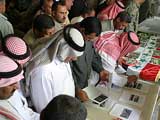Iraqi Oil Under the Hammer
By Dominic Moran for ISN
Last Tuesday's failed Iraqi oil and gas tender has again thrown into question government efforts to promote a central role for foreign interests in exploration, extraction and associated service provision in the face of burgeoning domestic opposition.
A services contract for the giant southern Rumaila oilfield was the only deal signed in last week's round of bidding. Twenty-year technical service and development contracts for six oilfields and two gas fields were up for grabs.
The stakes are high, with Iraq's current identified reserves standing at 112 billion barrels and national governments weighing in on the sides of their major energy interests.
Turned off by the Iraqi insistence on what they saw as unreasonable management and fee demands, most interested oil majors appear prepared to hedge their bets at this point.
The difference between the government offer per barrel on oil over the target production plateau and company bids was substantial, with some showing around a $20 gap in negotiating positions. BP and partner the China National Petroleum Corp agreed to halve their service fee to a low $2 a barrel after remuneration in winning the Rumaila contract.
Last week's failure likely presages a further round of tendering, with the ball now firmly in the court of the Iraqi Oil Ministry, which is seeking to bolster production by 60 percent over the next two decades and requires significant outside investment and support.
The length of the two-decade contracts raises eyebrows. Associated contract stipulations appear to affect the ability of the Oil Ministry to develop, oversee and manage both individual concessions and overall national petroleum strategies, critics allege.
While the relatively united front shown by competing companies in rejecting the Iraqi demands remains, significant pressure will build on the Iraqi government to acquiesce to higher fees and on other demands.
This is something Prime Minister Nouri al-Maliki is loath to do ahead of national elections next January, given the popular impression in Iraq of past profiteering by foreign energy interests at the expense of Iraqis.
The contracts have drawn flak from the Iraqi oil sector, parliamentarians and the Iraqi Federation of Oil Unions, with critiques focusing on the alleged alienation of key national resources and purported failure to prioritize national development in tender planning.
The process is being watched closely by small international oil and gas companies working under contract to the Kurdistan Regional Government (KRG) in the north. Their agreements are viewed as illegitimate by Baghdad.
While most of the northern fields are either in the domain of the KRG or areas claimed by the authority, the key Iraqi-Turkish oil export pipeline is in government hands. Tensions remain high despite the KRG giving Norwegian concessionary DNO the green light in May to pass oil from its new Tawke field via the pipeline.
Aside from political instability and wrangling, the volatility of the security situation is a clear factor preventing energy companies from committing to the development of fields given that the costs of further exploration and development remain largely unknown due to a paucity of reliable, up-to-date field information.
Sadly, the potential boon of large-scale oil and gas development looks set to be squandered through endemic corruption, politically motivated misappropriations and a related, fundamental failure to develop trustworthy management and oversight systems.
Iraqis are right to demand the primary role and reward in developing their crucial national assets.
However, regardless of the stake provided foreign interests, the Iraqi public is unlikely to enjoy the benefits of their country's carbon wealth.

